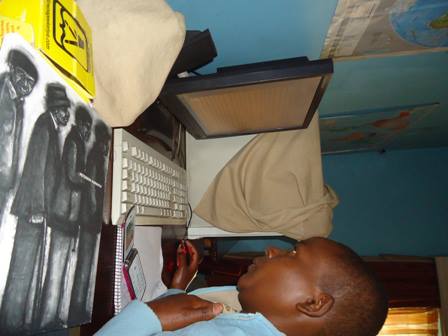By Sarah Kimani
Published June 14, 2013
 Some 765 youth in Nairobi have graduated from a 24-week programme that equipped them with the skills to improve their employability and rescue them from unemployment that plagues 40% of young people in Kenya. This was the second batch of youth to have passed through Kenya Youth Empowerment Project, a four-year pilot initiative of the Government of Kenya with the support of the World Bank that provides skills and experience within the private sector.
Some 765 youth in Nairobi have graduated from a 24-week programme that equipped them with the skills to improve their employability and rescue them from unemployment that plagues 40% of young people in Kenya. This was the second batch of youth to have passed through Kenya Youth Empowerment Project, a four-year pilot initiative of the Government of Kenya with the support of the World Bank that provides skills and experience within the private sector.
The graduation ceremony, held at Kabete Technical Training Institute in Nairobi on June 7, 2013, was presided over by James Waweru, the Permanent Secretary in the Ministry of Youth Affairs and Sports who urged the graduands to apply the skills they had acquired in starting small enterprises as not all of them could be employed in the formal sector.
Though more than 100,000 youth graduate from universities and colleges every year in Kenya, the country has limited employment opportunities. Idleness resulting from unemployment often lead many young people into vices like robbery, drug abuse and immoral behavior that ruin their lives.
The reality addressed above is likely to be what jolted the Government into coming up with strategies that could empower the youth to be self reliant through the introduction of Kenya Youth Empowerment Project in 2011 to provide skills in self reliance in case one does not secure employment. The project aims at having at least 50% of those who pass through it to secure employment or start their own businesses within six months after graduation
RELATED: Lola Kenya Screen 2013 Calls for Participation
This pilot project was introduced in the capital, Nairobi, before being extended to the second and third largest cities, Mombasa and Kisumu, as most employers are concentrated in these urban centres. The programme, that targets six sectors–Finance, Tourism, Information Communications Technology (ICT), Energy, Manufacturing, Micro and Small Enterprises–considered as being crucial to economic development, is expected to ensure Kenya attains a double digit annual growth from the current rate of 5.4%.
 The project equips participants with basic skills in self esteem, vocation and entrepreneurship on the realization that the prosperity of any nation depends on the skills-base of its citizens, the quality and transfer of those skills as well as a sound policy and legal framework to sustain quality growth in skill-development and linkages within the production sector. This ensures increased production and employment opportunities and reduced dependency levels.
The project equips participants with basic skills in self esteem, vocation and entrepreneurship on the realization that the prosperity of any nation depends on the skills-base of its citizens, the quality and transfer of those skills as well as a sound policy and legal framework to sustain quality growth in skill-development and linkages within the production sector. This ensures increased production and employment opportunities and reduced dependency levels.
Though the programme targets to have equipped 11,000 youth by the time it ends in 2014, only about 3600 have passed through it. The project also appears wanting as it fails to meet the expectation of many of those who pass through it; after the six months of training, the government does not provide any help to the youth. The US$75 allowance per month given to each participant for fare to and from the work place during internship is too little for one who lives in Nairobi where the cost of living is very high.
Sarah Kimani is a Journalism and Public Relations Intern at ArtMatters.Info.





